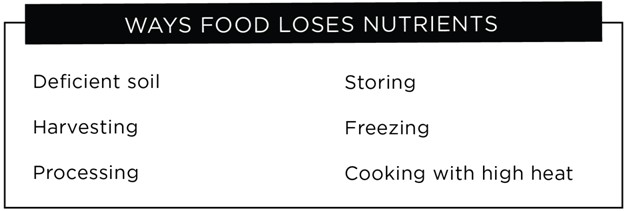

No one wants to be deficient on any of the aforementioned nutrients in Chapter 4 of my book, Your Longevity Blueprint, especially when it’s so simple to fix the deficiencies. Having even subtle deficiencies won’t allow your body to unlock necessary doors. That’s a simple way of saying these deficiencies can lead to DNA damage, which then leads to chronic disease and cancer. Why are we so nutritionally deficient? With age, people make less of many nutrients, and their digestive processes start to decline, but that’s not all. There are several other reasons. Do you eat the Standard American Diet (SAD)? If you are, you are setting yourself up for nutritional deficiencies. Fast food is processed and doesn’t contain the nutrients and enzymes that fresh food does. Remember as you are your digestion also slows down. If your digestion or absorption is poor, you can be left nutritionally deficient. That’s why the gut is the foundation of your health mentioned in my book. Many of my patients continue to wonder why they can’t receive all the nutrition they need from food just as their grandparents did. Times have changed. Let’s learn why.
Deficient Soil
Since the 1950s, the nutrient content in our foods has been on the decline. US Department of Agriculture (USDA) figures demonstrate a decline in over forty crops that the agency tracks (USDA). For instance, it has been estimated that magnesium content in foods has declined 25 to 80 percent (Ancient Minerals 2015). Why? Sources suggest that this is for several reasons, two of which are over-farmed, depleted soils, and the processing of foods (Ancient Minerals 2015). Let me be clear, we need farmers. Being from Nebraska, and living in Iowa now, half of my family farms. However, farming has changed. Farmers used to use manure for fertilizing, and now they use pesticides and chemical fertilizers. They used to rotate crops more than they do now, which helped to suppress insects and diseases.
Our foods are the product of our soil. I think we often forget that. If the soil has been robbed of magnesium, would we expect our food to be any different? Soil should be rich in antioxidants, vitamins, and minerals, producing foods high in the same. Vegetarians should supplement with B12, since their vegetable-based diet is low in B12. But did you know that this didn’t use to be true? Root vegetables used to be higher in B12. Because of the use of pesticides and herbicides ridding the ground of living weeds, earthworms, and natural fertilizers, the soil has been dramatically altered. Extinguishing the ground from this living vegetation is primarily why the vitamin and mineral content has declined. The herbicide atrazine is cheap and popular. It can be applied to crops to control weeds before they emerge. But did you know that it can cause mitrochondrial dysfunction, which is the term for ridding the body of the ability to create energy? It can also cause insulin resistance and diabetes.
I always wondered how farmers get rid of remaining herbicides and pesticides after they’ve covered their land. Or what about accidental spills? I’ve read of farmers dumping the remains into nearby ditches or streams. This is obviously going back into our water system. Overgrazing and not rotating crops leads to increased dependence on pesticides. And if you think those herbicides and pesticides aren’t getting into our water, you are crazy! We used to fish in a little pond on my grandpa’s farmland. At the time, I wasn’t thinking about the fact that the fish I was so proud to catch and eat likely had been contaminated with herbicides and pesticides that had run down from the farmland.
In Silent Spring, author Rachel Carson discusses how hazardous these chemicals are to animals (Carson 1962). Dichlorodiphenyltrichloroethane (DDT), for instance, was found to have accumulated in fish, reptiles, birds, and mammals (Carson 1962). Yet we assume we won’t be affected. Wrong! Insecticides can kill birds and fish. They are likely more harmful to humans than herbicides, because we are more similar to insects than we are to plants. Herbicides can damage our DNA. They certainly kill earthworms. I had no idea how valuable those little free workers were until I attended a conference where our devastating soil loss was discussed. Worms help preserve and save our soil, because their burrows soak up water from rain, which would otherwise erode the soil.
Again, all these chemicals destroy the natural biological activity and deplete the soil of necessary nutrients, resulting in nutrient-deficient foods. Living near factories (which manufacture high fructose corn syrup, I must add), I can see the pollution chugging into the air daily, and often I can smell it. That pollution essentially comes right back down on our farmlands in the form of contaminated rains.
No doubt, industrialization has contributed to our lands and waters becoming contaminated.
Processing
It was already known back in the 1930s that processing foods depletes their nutrients (like vitamins and minerals). Processed foods were created in war time so that we could ship food long distances. The best way to prevent food from going bad is to remove the nutrients that attract bacteria and insects. When food is processed, ingredients that “go bad” are removed. Real food “goes bad,” because it is truly alive. These things that “go bad” are what you should be eating. You should choose to eat only foods that will eventually go bad or rot— foods that fungi and bacteria actually want. Food processing separates plant food sources, often removing the portion containing most of the nutrients, such as magnesium. For example, a safflower seed contains 680 mg magnesium per 100 calories, yet when the seed is processed into refined oil, the final product contains no magnesium (Seelig and Rosanoff 2003). Our foods are also mostly of the same variety, the high-performing variety. So we buy one type of chicken, one type of broccoli, and one type of corn. Also, it’s been said that 75 percent of the vegetable oils we now consume are from either corn or soy (Pollan 2007). Because we can extract carbs from corn and fats and protein from soy, we can now find corn and soy in the majority of processed foods
in our grocery stores.
Harvesting/Picking
Foods also start to lose their nutritional value once they are picked. The average time between when a food is harvested and when it is eaten varies. It’s been said that produce loses 30–90 percent of its nutrients in the three days after harvest (Eng 2013). It would be ideal to have your own garden and pick your food immediately before dinner. That would preserve the most nutritional value possible.
Storing and Cooking at High Temps
Storing processes like canning and freezing can also reduce nutritional value in foods, although the results of studies are variable. Cooking at high temperatures for long periods of time can also reduce nutrient content in food, since it can cause proteins to denature or come apart. B vitamins and vitamin C are water soluble, and, when cooked with water, these vitamins can leach out of the food into the water. Microwave cooking can also be dangerous, due to the radiation and the container you are cooking your food in. For instance, cooking plastic under that high heat can cause dangerous toxins to leach into your foods. If you use a microwave, use a safe container like glass.
(Your Longevity Blueprint, 2017, page 170)
Still not convinced you could be nutritionally deficient?
Check out my next blog discussing how medications and even your lifestyle can contribute to nutritional deficiencies?
Want to know what nutrients you need personally? We offer an amazing test for that which I will discuss in an upcoming blog.
Want to get started on a high quality multivitamin with or without iron? Check out these links to some of our top selling products!

